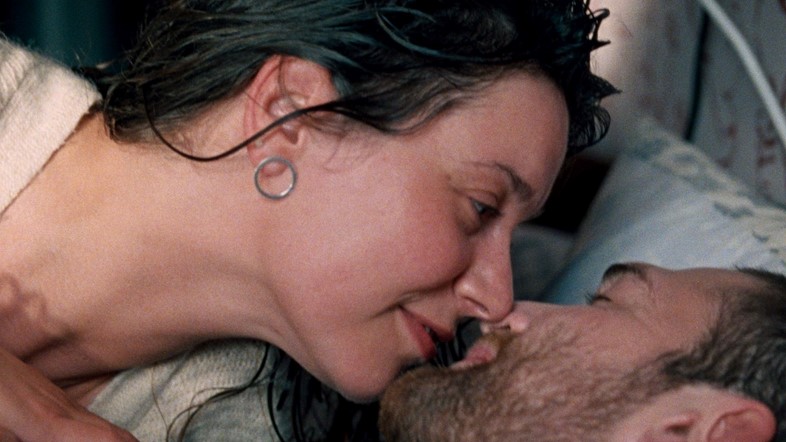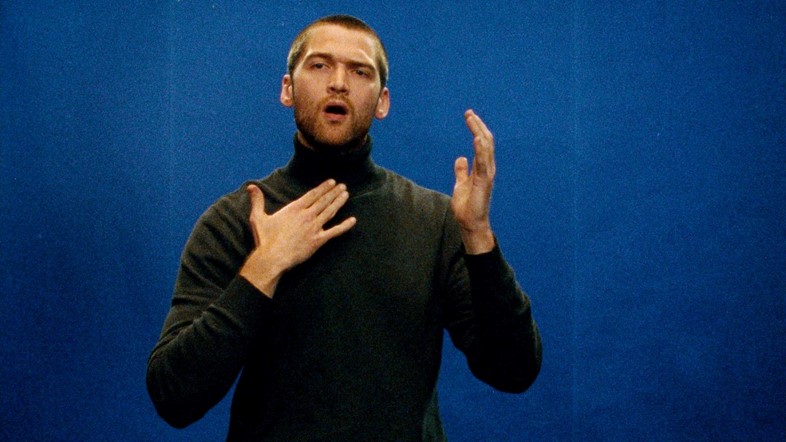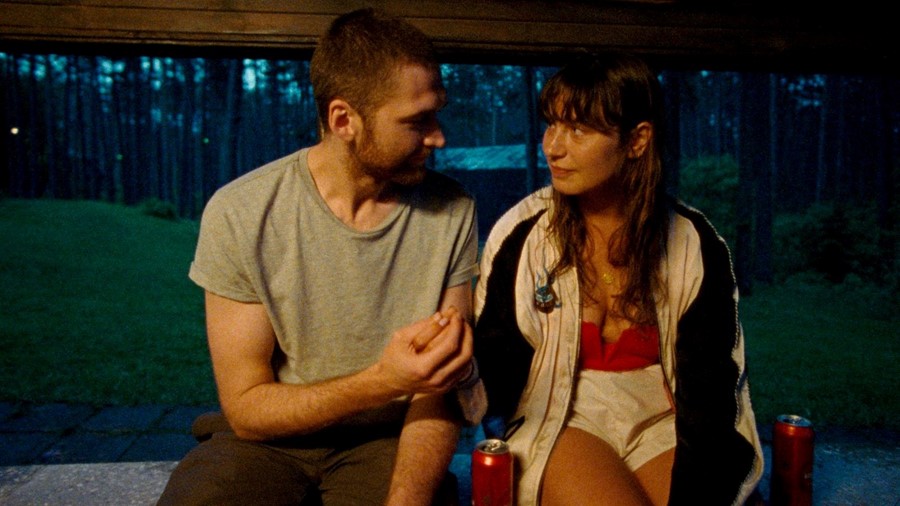As Slow is released in UK cinemas, Marija Kavtaradzė talks about her intimate drama exploring a sexual orientation still misunderstood by many
Marija Kavtaradzė and I are discussing the loneliness of the long-distance asexual dater. I’d just discovered an app, Taimi, which offers a dating service for members of the asexual (Ace) community. But what are the practicalities of such a platform? Asexual people have been estimated as making up around 1% of the general population – an admittedly flimsy figure which, taken at face value, would give you a grand total of 288,000 potential partners in the director’s home country of Lithuania. Take out the kids and those too old to care or avail themselves of such services, and it starts to look like slim pickings for those looking for love with sex taken out of the equation.
“It’s not even easy to meet someone you like when you’re not asexual, you know?” says Kavtaradzė over Zoom from her home in the capital, Vilnius. But the focus of the 32-year-old director and screenwriter’s new film, Slow, is the blossoming romance between an asexual man and an allosexual (read: sexual) woman, which creates an entirely new set of problems. “When I was writing I was talking to my friends and some people would get a bit triggered by it. They were like, ‘Shouldn’t he be dating [other] asexual people? Why is he doing that?’ As if he was doing something wrong!”
In Kavtaradzė’s film, Elena (Greta Grinevičiūtė) is a choreographer and dance instructor working in Vilnius. When a handsome stranger, Dovydas (Kęstutis Cicėnas), turns up at her studio one day to interpret for a class of deaf kids, the pair hit it off and decide to go for a drink together. The electricity between them is plain, but, when Elena brings him back round to hers, Dovydas tells her he’s asexual. Momentarily stunned by the news, her first instinct is to laugh. “We actually worked a lot on that scene,” says Kavtaradzė. “Most of the versions [we tried] were way heavier, and actually the laugh came much later. It was a bit awkward, but it also kind of felt more truthful somehow, because [Elena] feels a little bit rejected in that moment.”
It’s a lightness of touch that serves the film well, Cicėnas and Grinevičiūtė sharing an easy rapport that brings charm and good humour to some potentially thorny material. (To help establish the tone, Kavtaradzė thumbed through her copy of Sally Rooney’s Normal People.) But the issues it touches upon are real enough. The filmmaker cites one unnamed journalist who, after the film’s screening at a festival, asked her point-blank why Dovydas is asexual. “It’s like, there is no why!” she laughs, exasperated. “I still feel like we don’t really register [asexuality] as an orientation. People always want some kind of an answer, like, ‘Maybe it’s [because] they experienced some traumatic events.’ And I would just be like, ‘OK, but try to imagine if you’d said this about any other orientation. Imagine how you would sound!’ And they’d be like, ‘Oh, shoot, yeah.’”
As a love story without sex, Slow finds ways to convey its characters’ sensuality through their work, Elena in a series of interpretive dance scenes that Grinevičiūtė, a real dancer, embodies with sinuous grace, and Dovydas in a trio of transfixing scenes performed for the camera, interpreting the lyrics to songs that loosely narrate the story of their relationship. (Kavtaradzė made Cicėnas attend sign language classes for the role, a task she jokes he was “annoyed” about.) “One of the key words we had [on set] was ‘bodies’ – how we see bodies, how we portray them, so of course their work made an intuitive kind of sense,” says the filmmaker, who sought to capture their movements in nervy close-ups that fairly crackle with excitement.

Slow develops as Elena and Dovydas, pushing past their initial embarrassment, feel their way around a relationship like no other they’ve experienced before. In writing her script, Kavtaradzė says, “I did feel kind of like walking on a thin line.” This was a few years ago, before the likes of Sex Education introduced asexual characters to the screen, and her only point of reference was Todd, a character from the animated show BoJack Horseman, who tells his friends he doesn’t think he’s gay or straight, he just thinks “I might be nothing”. The director took to reading stories on Aven, a website connecting people from the Ace community, where she learned that asexuality covers a broad spectrum of sexual orientations, including apothisexuals (who are repulsed by sex) and greysexuals (who only experience sexual attraction under certain circumstances).
Seeking advice from Aven’s online community, she was most taken with one person “who just kind of asked me not to make the asexuality the main problem, which is something I really tried to keep in mind”. As their relationship deepens, the pair open themselves up to new possibilities: Dovydas, questioning the stranglehold sex seems to have on notions of trad masculinity, says they could make their relationship an open one, while Elena offers to keep it exclusive. The problem, says Kavtaradzė, is they are both trying to be what they think the other person wants them to be, a dilemma that will resonate with plenty of young people trying on different relationships for size, asexual or otherwise: “I think it’s more about communication. It’s more about them trying to fit in with certain societal norms, the way they imagine them, that actually holds them back, not the sexuality.”
Kavtaradzė’s decision to make her male lead the asexual partner in the relationship was a pointed one; during her research, she noticed many more Ace women talking about their experiences than men, a trend she attributes to the fact that, “for my generation, we grew up with this mindset that women never really want sex, and men always want sex, which just isn’t true”. That rebuttal can also be felt in the character of Greta, who bucks messy-millennial-woman cliches by enjoying a series of flings before meeting Dovydas, not to plug some kind of spiritual void in her life, but because it can (gasp!) sometimes be fun. “It was a tricky balance, because I didn’t want to make out like all her sexual encounters are super fun,” says Kavtaradzė. “But I also didn’t want there to be this drama around it – like, she’s so chaotic! She’s so messy! Because Elena is pretty sure about what she wants.”

Kavtaradzė is vocal about her desire to see female characters who are “cool, but also realistic” on screen, an ideal she sees as sometimes getting lost in the trend for quote-unquote ‘badass’ women. “If it’s a strong character [there’s this temptation] to make her so strong, so cool and so crazy powerful,” she says. “And it’s like, yeah… I mean, I’m a cool woman, but I’m not that powerful or whatever. And I don’t want to carry this weight on my shoulders, you know?”
Ultimately, it’s the sparks that fly between her two leads that give this story its allure and even, dare we say it, its sexiness. “I don’t know if it’s wrong that we made a pretty sexy film about this [topic],” says Kavtaradzė. “But I think it mostly comes from that intimacy, you know?”
Slow is out in UK cinemas now.
